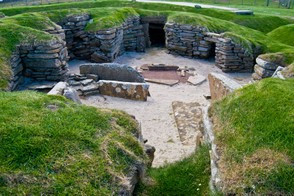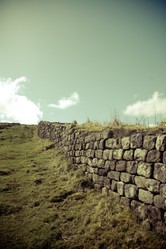I recall once watching a television programme when Francis Pryor was explaining his work, "What the aristocrats had for breakfast I leave to Starkey [the royalist historian of the British establishment] I am interested in the ordinary people" he says. Yes! My heart and mind resonated in concurrence. Similarly, in the Introduction to Home, Pryor states his view that the Victorian period is named after a person who spent her life doing very little, and that it would be more aptly named the Navvian, after the navvies, many of them Irish, who constructed Britain, and who worked enormously hard. Again,I concur.
Pryor rejects top-down narratives. In these narratives history is believed to be created by elites. Thus he is uninterested in the behaviour of kings and the ruling class, and points out that a royal visit to a small town might make a mention in the history books, but changes nothing. Similarly he rejects the view that social change is always created by elites handing down decisions from the top, delivering the fruits of their superior wisdom to grateful, but dumb peasantry. This top-down view he associates with the now discredited "march of mankind model" which saw history as a linear progression driven by elite individuals, classes and races who drive the rest forward, if they can, dispensing with those who cannot make progress, often humanely but not always. In the top down model only the lives of elites are worth recording, the rest are the anonymous chaff of history.
Pryor supports the view that left to themselves ordinary people acting as groups and families have been responsible for much social progress as the human race has been driven forward. This view is termed bottom up explanation. It is interested in aspects of history and prehistory completely opposite to the top down view. Pryor is in this book using archaeology to study home life in prehistory. His is a view that is more fair to women than the top down view,for as we know elites have tended to be male, and in their history women are seen as being of secondary importance, rather like ornaments or hangers on, but in Pryor's attitude to history, which studies ordinary life, women and ordinary men are the main subject, and are seen as the engine of change throughout history,making decisions and working collectively towards their goals. In the top down view the ordinary people do not account, they are cannon and industry fodder, but in the the view from below,their feelings and concerns are the stuff of life itself and really matter. For these perspectives alone the book is worth reading.
But you also find that the author reveals something of his own personality in Home, speaking of personal experiences. He is particularly keen to give proper credit to his wife,Maisie Taylor, an archaeological boffin in her own right, an expert in ancient wood. Whereas for some men the woman is an anonymous dishwasher and cook, whose career is an added and unwanted extra, Pryor celebrates his wife and gives her credit. Maisie has appeared on television much less than Francis has, but we suspect that is by her choice.







 Pilgrimage. A review27 days ago
Pilgrimage. A review27 days ago
 Leo the Fourteenthon 05/09/2025
Leo the Fourteenthon 05/09/2025
 The Melsonby Hoardon 03/25/2025
The Melsonby Hoardon 03/25/2025



Comments
People journeyed to Britain at the end of the Ice Age frommSpain, mainland Europe and across Doggerland, which was the yet to be flooded North Sea
Thank you for your comment below in answer to my previous observation and question.
The last paragraph begins with the sentence that "The book is a sustained analysis of domestic life in Britain from the Mesolithic age, when humans returned to the island after the Ice Age, up to an epilogue which discusses post-Roman Britain."
Is it known where people journeyed to from Ice-Age Britain?
Very accurate.
Thank you for your comment below in answer to my previous observations and questions.
Muscle power can equate with politico-socio-economic power, personally, professionally, publicly.
But perhaps also male ruling elites developed because of females doing what they do according to what does not damage the foetus or the newborn. That at the bare minimum makes them vulnerable for 9-plus months!
What might you think of that contribution to male ruling-elite tendencies?
Strange, I was thinking of this issue this morning.Elites are ways in which powerful groups establish privilege. They tend to be male because to put it simply, males have the muscle. This is immoral, but what can be done about it.
The third paragraph to the first subheading, Bottom-up and top-down narratives, advises us that "His is a view that is more fair to women than the top down view,for as we know elites have tended to be male, and in their history women are seen as being of secondary importance, rather like ornaments or hangers on, but in Pryor's attitude to history, which studies ordinary life, women and ordinary men are the main subject, and are seen as the engine of change throughout history,making decisions and working collectively towards their goals."
Some ancient religions deferred to a mother goddess.
Why is it that a woman power-holder worked as a deity but not as ruling elites? Might mother-goddess religions have been in the minority in all places, throughout all times?
You are almost certainly right on the matter of monarchy. However, I think that it slowly evolved as some men grasped power and held onto it for themselves and their families. Yet different monarchical systems evolved with different systems of inheritance. In the British Isles we had the Pictish system of matrilineal inheritance [which I think also operated in Ireland for some time [s this is the best way to explain the dominance of Queen Maeve shown in the Tain Bo Culnaigh story.] There was the Gaelic system that involved choosing from the best member of a ruling family, and the present system of primogeniture, which was kept by Saxons and most Britons. Monarchy arises out of war, as we see in the First Book of Samuel in the Bible with the story of Saul's elevation to kingship, at a time when fighting the Philistines was the main issue for Israel.
When going back so far as 8000 B. C. I would be surprised if the idea of monarchy had even been thought of, although barbarian rulers were the biggest bully of the bunch, and they probably had bullies. But perhaps people were so scattered there was no group to reign over. Maybe every man was a family man.
DNA was not recovered, for it is likely that that the people there excarnated their dead, which involves leaving them to be eaten by birds and wild creatures. This was practised in parts of Britain. However, the geneticist Openheimer argued that East Britain was originally populated at the end of the Ice Age by immigrants from Denmark and Eastern Europe, who had crossed the then dry North Sea, so they may have looked quite fair skinned, as the Danes are.
frankbeswick, Thank you! Common to elite interactions can be so informative, particularly when people nowadays ponder what is and is not enduring -- technology apart -- about people getting together in nuclear families, extended networks, and ethnicities.
Do you know if DNA has been retrieved from Howick House and Star Carr? What are the suggestions as to how the various populations got there and what they looked like?